Teenagers from Iowa form strong bonds, experience local culture on exchange trip
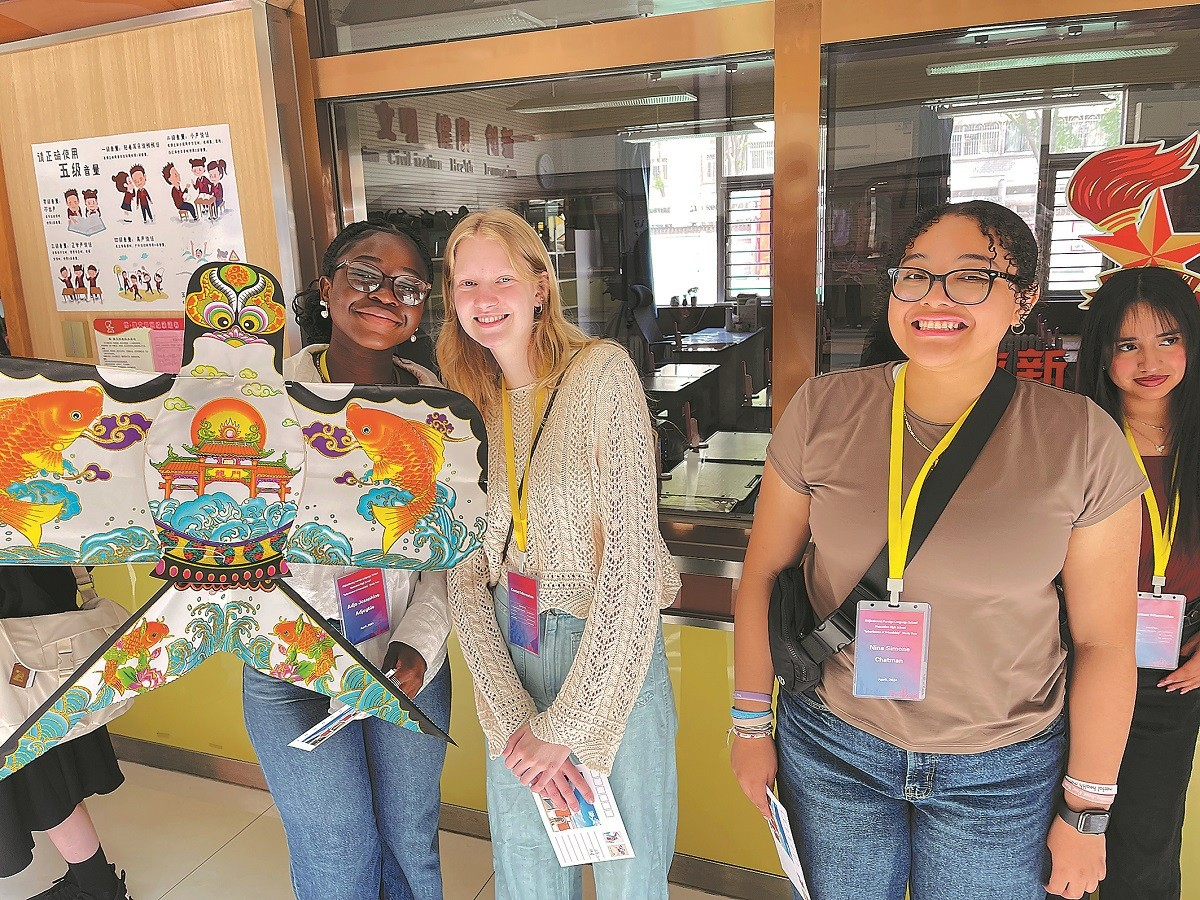
US students inspect a kite used as a teaching aid at Shijiazhuang Foreign Language School on April 20. ZHANG YUNBI/CHINA DAILY
Chinese and US students learn to make dumplings at Shijiazhuang Foreign Language School on April 20.
More than a month ago, high school students from China and Iowa in the United States' Midwest inaugurated and planted the first batch of trees for the China-US Friendship Youth Woods in Hebei province's Zhengding county, where President Xi Jinping worked as a senior local official from 1982 to 1985.
Zhou Yitian, a senior high student from Shijiazhuang Foreign Language School, planted a tree with her new friend, Grace Zorich from Muscatine High School.
"This is the first time I've planted a tree as big (as this), but I planted a tree before… a very little, little one," said Zorich. Her horticultural skills, including her proficiency with a shovel, impressed her Chinese teenage peers.
Zhou said: "I hope the tree grows robustly alongside our friendship. Of course, I'll be back someday to revisit these trees."
The woods, which feature species such as the North American red maple, are lush and thriving, and are expected to welcome more US students.
In San Francisco last November, President Xi proposed an ambitious program to invite a total of 50,000 American youths to visit China for exchanges over the next five years.
Hebei and Iowa are natural choices for boosting subnational bonds as they have enjoyed a sister relationship since 1983 and have had ongoing exchanges in the agricultural sector.
Two delegations from Muscatine High School have traveled to China and Hebei this year. The second delegation of 32 students and eight teachers stayed in Hebei from April 19 to 22 at the invitation of the Shijiazhuang Foreign Language School, one of the leading middle schools in the province.
It was the first time any of the US high school students had visited the country beyond the Pacific Ocean. They arrived in Beijing first, and then traveled to Hebei before heading to Shanghai to end the tour.
During the trip, students from both countries, such as Zhou and Zorich, were paired together.
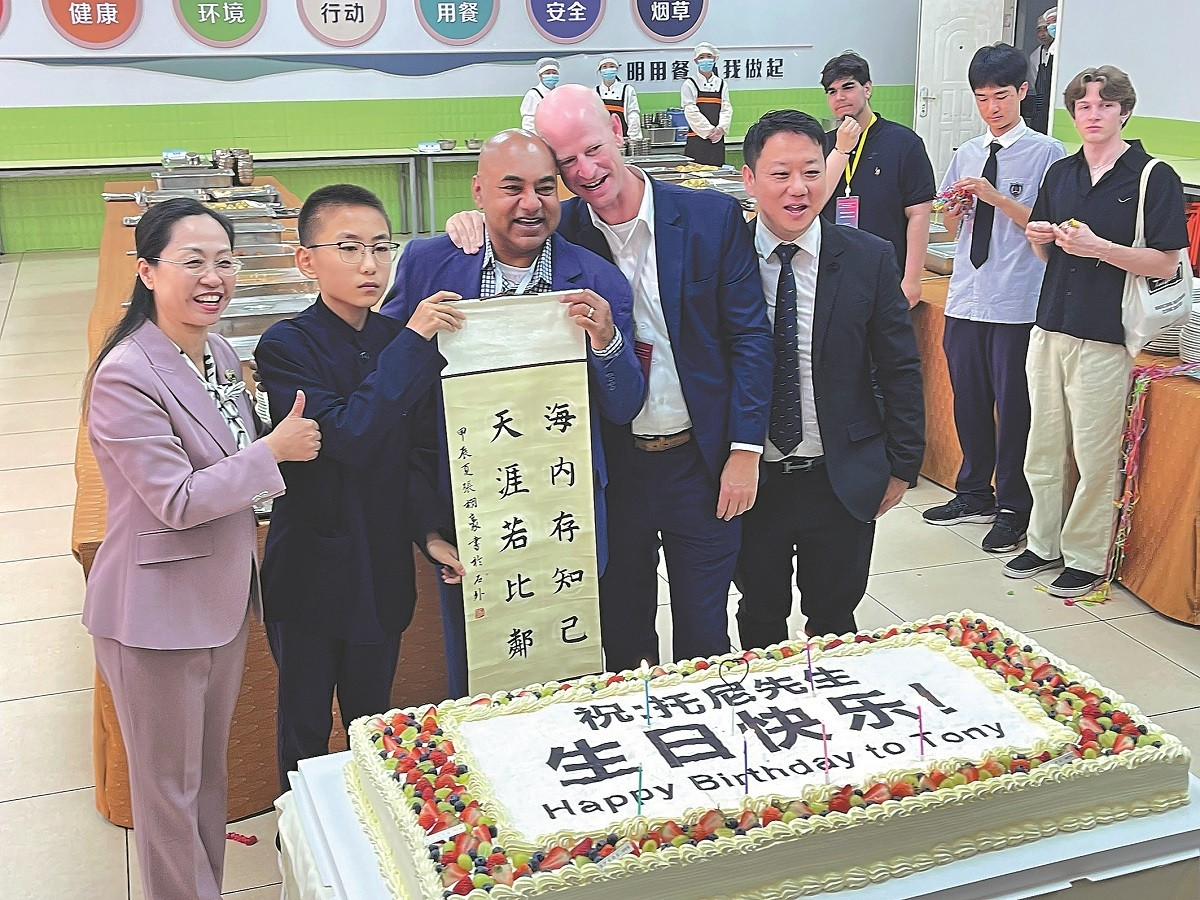
Teachers and students of Shijiazhuang Foreign Language School celebrate the birthday of Tony Joseph from Muscatine-China Initiatives Committee on April 20 in Shijiazhuang. ZHANG YUNBI/CHINA DAILY
Versed in culture
Liu Feng, vice-principal of Shijiazhuang Foreign Language School, which is affiliated with the main school, said they arranged for the US students to take part in calligraphy and paper-cutting classes so they "can have a taste of Chinese teenagers' school life".
They consulted the visitors in advance over the trip's arrangement, agenda, and itinerary to ensure adequate communication between students from both sides during the limited time they had together over four days.
The US students said they wanted to take Mandarin lessons with Chinese students.
Liu's school selected an ancient Chinese poem "Rural Life" as the centerpiece of the lesson:
"Over green grass orioles fly in vernal sky/
The mist intoxicates the willow trees./
Back early after school, the children try/
To fly the kites in eastern breeze."
Kristina Devries, one of the US students, admitted that the poem was a bit difficult for her. "It's mainly the tones," she said.
Yet after the class, most students could read the poem properly in Mandarin.
Observing that the poem echoed the then season of spring, Jasmine Montes, another US student, said, "It is really pretty and I like it."
When asked if US children fly kites these days like people did decades ago, Ryan Castle, principal of Muscatine High School, said: "Not as much any more. We used to. With phones and iPads, it's hard to get kids to fly kites."
Lyu Fei, an English teacher at Shijiazhuang Foreign Language Primary School, was involved in the special class for the guests and she had no language difficulties when talking to the US students. Her recipe for successful communication included body gestures and the use of humor.
"They are real quick learners," she said, saying the visitors mastered the poetry faster than she had expected.
"So, we had some extra minutes to review and practice more. I'm so proud!" she laughed.
Another first for the trip was the host school arranging a musical performance that involved collaboration between the Chinese students and their foreign guests.
The US students split up and went to several classrooms to be taught how to play the hulusi, or gourd flute, an easy-to-learn Chinese folk music instrument.
Later that afternoon, they joined the Chinese students on stage and together they played the song Auld Lang Syne using the hulusi. The performers received warm applause from the audience.
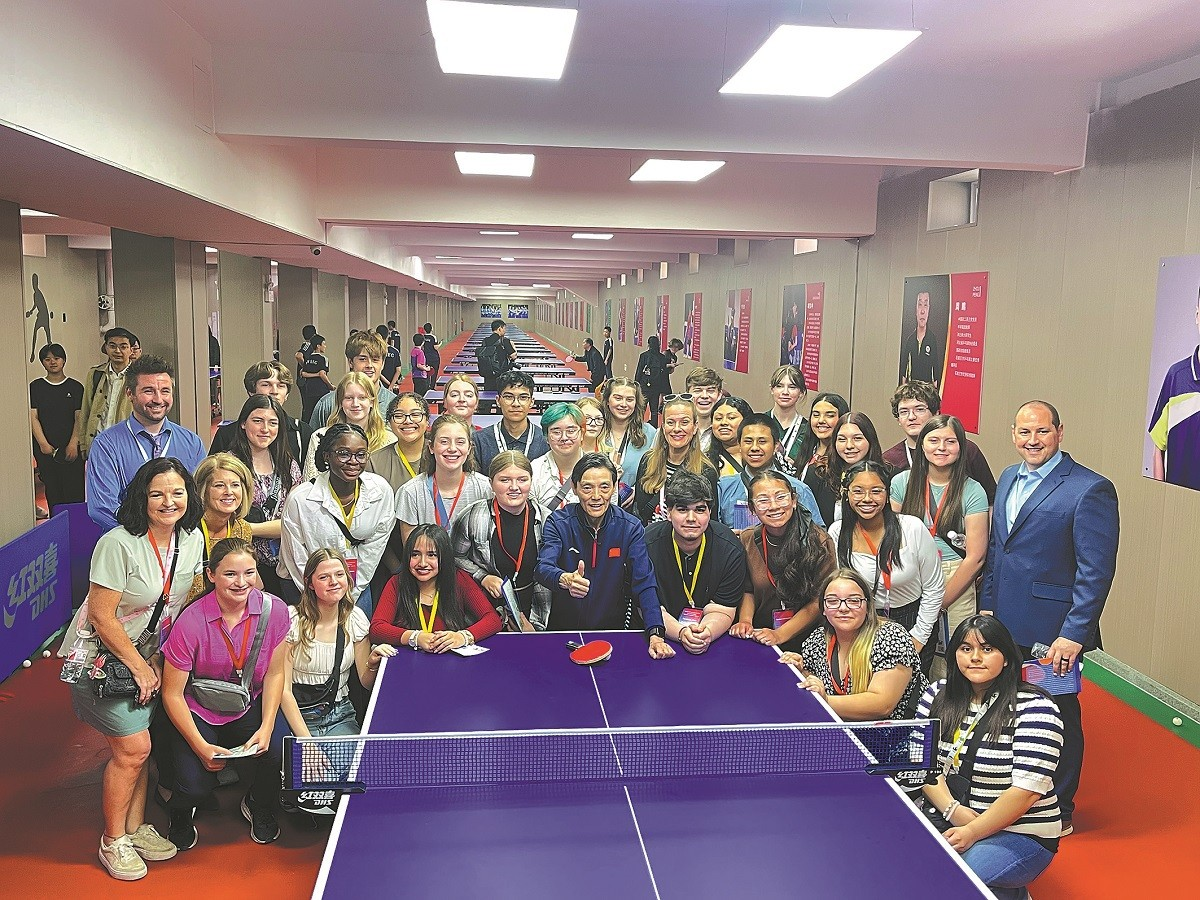
Chinese and US students pose for a group photo after learning table tennis skills at Shijiazhuang Foreign Language School on April 20. ZHANG YUNBI/CHINA DAILY
Stronger together
As a key promoter of the China tours, Sarah Lande is one of Xi's "old friends" from Iowa who hosted Xi in Muscatine when he first visited the US in 1985 as a county-level official.
After a reunion with the president in San Francisco in November, Lande wrote to Xi and expressed her hope that the Muscatine High School students could join the youth exchange program.
In January, Xi replied that he welcomed the school's students participating in the program.
When talking about what the US students could learn from the trip, Lande said she expected them to "appreciate China through their own eyes, how they are growing, how we are together, how we are similar, and then how we are different".
"There's so many opportunities to work and cooperate with students and learn from them all over the world," she said in a video message prerecorded for the trip.
Lande also had a welcome message for the exchange students from China. "We want to share our culture with you, our music, our environment, and show you our friendship," she said.
"So please come so we can share with you what you've been sharing with us, and build the foundation between our countries even stronger," she added.
During the latest exchange, the Chinese hosts learned more about the US as the delegation promoted their local culture through gifts they had prepared. Among them were colorful, delicate pearl buttons, as the Mississippi River town of Muscatine produces a large number of them.
Another intriguing gift was a badge promoting Iowa Corn, with a corn pattern on it.
"This is from our Iowa Corn Growers Association. We just want to make sure everybody is aware that Iowa corn is our top export," said Castle, the school principal.
At a local performing arts center, the guests from Iowa were overwhelmed by a multimedia musical performance called China Impression, which was choreographed and created by teachers and students from the host school.
The hour-long show featured the school's classical orchestra and its Chinese traditional orchestra on the same stage.
Dressed in costumes, the student performers presented examples of Chinese cultural heritage, such as poetry from the Tang Dynasty (618-907), conveyed through songs and readings.
In the school's gym, it was the Chinese students' turn to be amazed by their US peers who showed great proficiency at a table tennis practice session.
All the students also enjoyed a master class given by Lu Yuansheng, a former head coach of China's national women's table tennis team.
While table tennis is popular in China, there are fewer opportunities for US teenagers to get to love the sport, Lu said. "Some of the kids are just beginners, so I just taught them some ABCs and how to get some practice going at home, such as tossing and catching the ball against a wall," he told China Daily. "It's quite a fun sport, and it has great benefits for their eyesight, too."
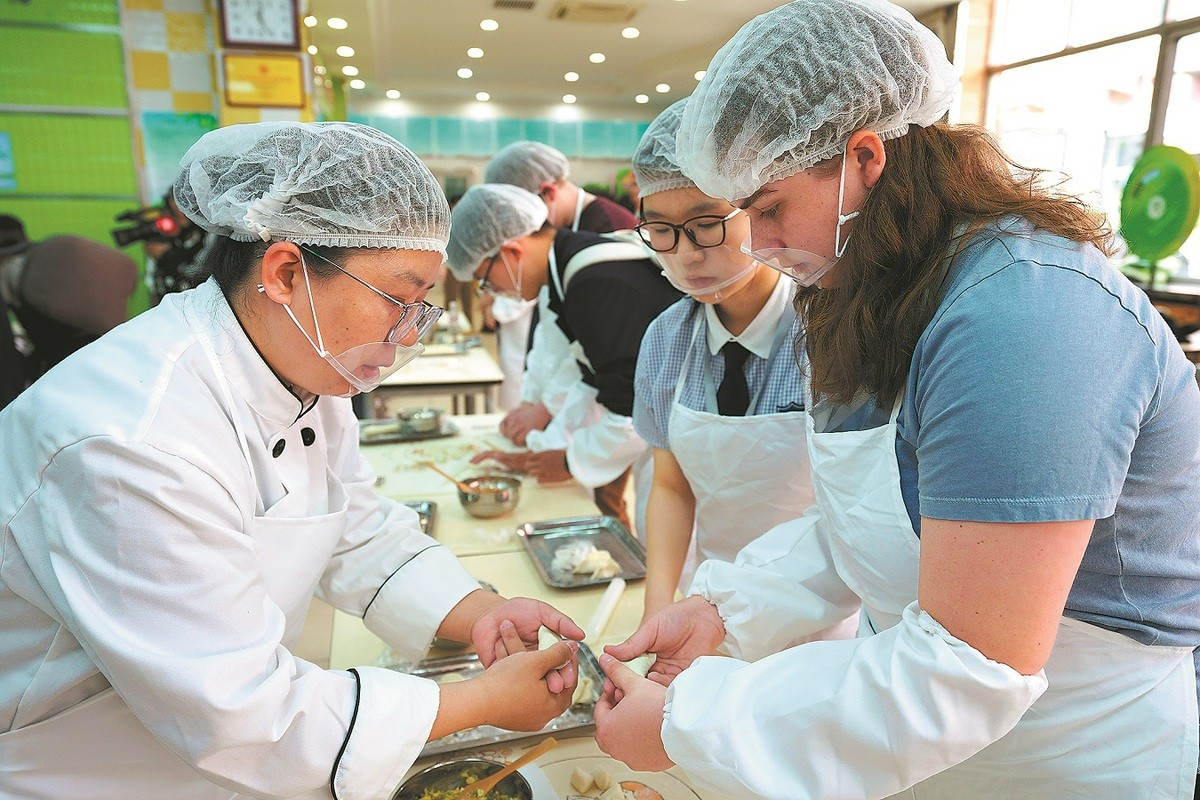
Chinese and US students learn to make dumplings at Shijiazhuang Foreign Language School on April 20. ZHANG CAN/XINHUA
Warm home visit
Visits to the homes of ordinary Chinese families added a deeper personal touch to the US students' trip.
Brynn Castle, who is due to start studying at college soon, was invited to visit the home of Zhang Xinyi, the Chinese student she was partnered with, the night before leaving Hebei.
"It was a really cool experience to see how their home is laid out and the similarities and differences between their house and my home," Castle said. "In my home (in Iowa), we have a lot of decorations, but they're more gifts from other people or family photos."
She said one of the main differences was that the decorations in the Chinese home had deep cultural symbolism.
"They had a lot of symbolism for good fortune. A lot of the symbols are red," she said, adding there were fish images on the wall and other omens for good fortune in the coming year.
The family members she met were "so kind" and "very welcoming", Castle said.
Before going to the apartment, Zhang's mother and cousin joined the pair and showed the US student around the neighborhood near their apartment.
They dined out, and Castle was impressed by the hot pot, as well as lamb served with a peanut sauce she had chosen.
They then went to the family home. In Zhang's room, the two girls quickly found they shared a lot more interests and had a great deal to talk about.
In the sitting room, Castle and the family members enjoyed tea and snacks, browsed photo albums and shared interesting stories about each other's families. They even exchanged tips on keeping pets.
"I didn't get to talk to them as much (directly), as the language barrier is a little difficult. But my partner translated for me, so I talked to them as much as I could," Castle said.
As they said goodbye late in the night, Zhang gave a Chinese history book and a persimmon-shaped memento to Castle as gifts. In Mandarin, the pronunciation of persimmon is similar to part of an auspicious phrase-"all things go well".
"May it bring you good luck and light your way forward," Zhang told her US friend.
Castle called it "an emotional night" and one for which she was very grateful. "If she comes to America, I would love to show her my home and show her Iowa," Castle said.
At Yuerong Park in Hebei's Xiong'an New Area, the students from both countries attended the last scheduled event of the exchange trip — a relaxed stroll around the park after lunch.
Four of the US female students were intrigued when they saw older women dancing in a meadow and decided to join in.
When it was time to say a final goodbye, many of the students who were paired together exchanged gifts, signed notes and writing pads for one another, and tightly embraced.
One of the male students from Iowa gave his Chinese friend a brand-new $20 bank note as a present.
"Go find a girl and buy her some flowers," he said in a sincere voice with a big, sheepish smile.

A student of Muscatine High School takes part in an ethnic dance during a visit to the High School Affiliated to Beijing Normal University on April 18 in Beijing. LIU ZUNSHUAN/XINHUA
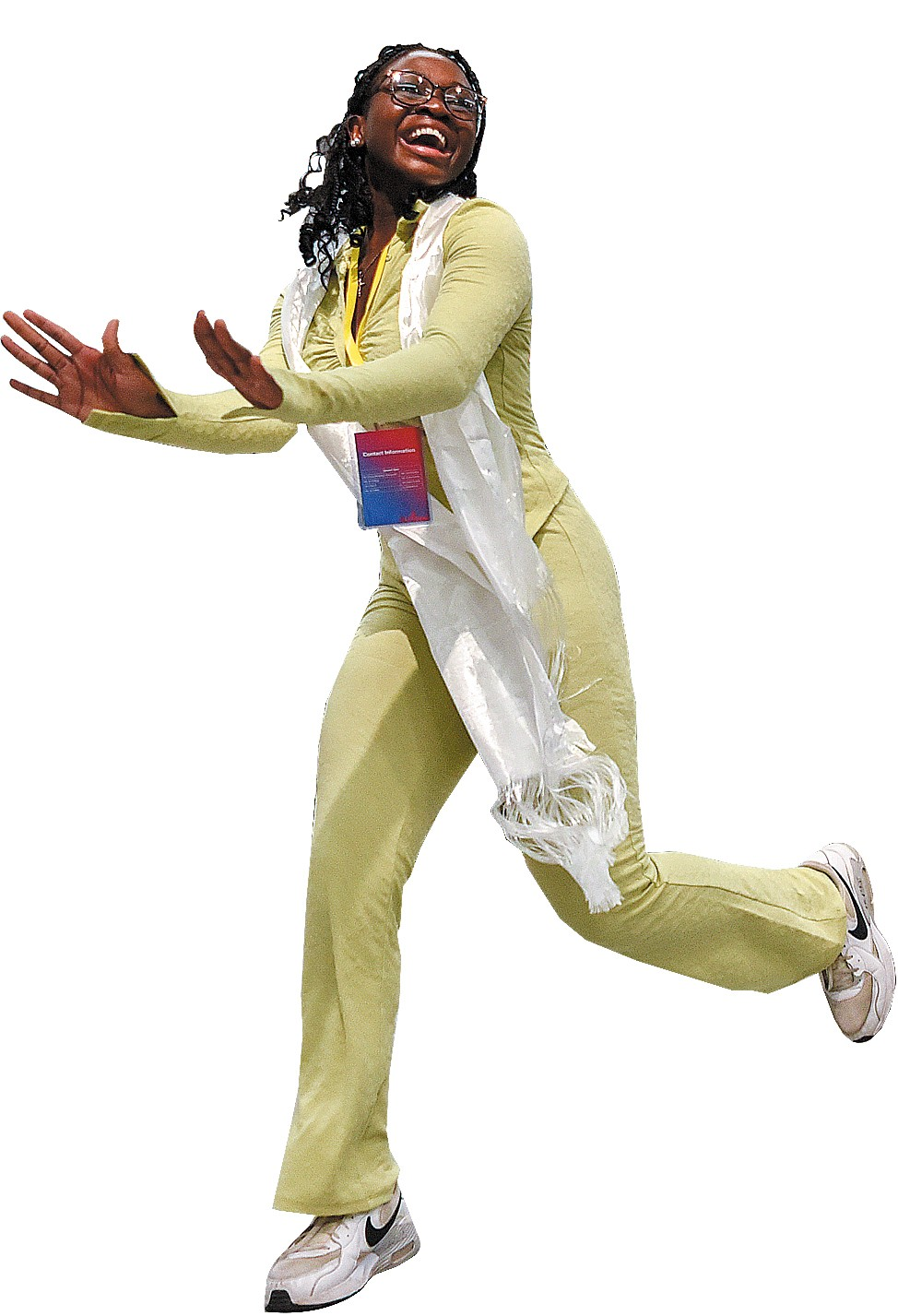
Chinese students hold plush toys during a visit to a zoo in Shijiazhuang, Hebei province, on April 21. LIU ZUNSHUAN/XINHUA
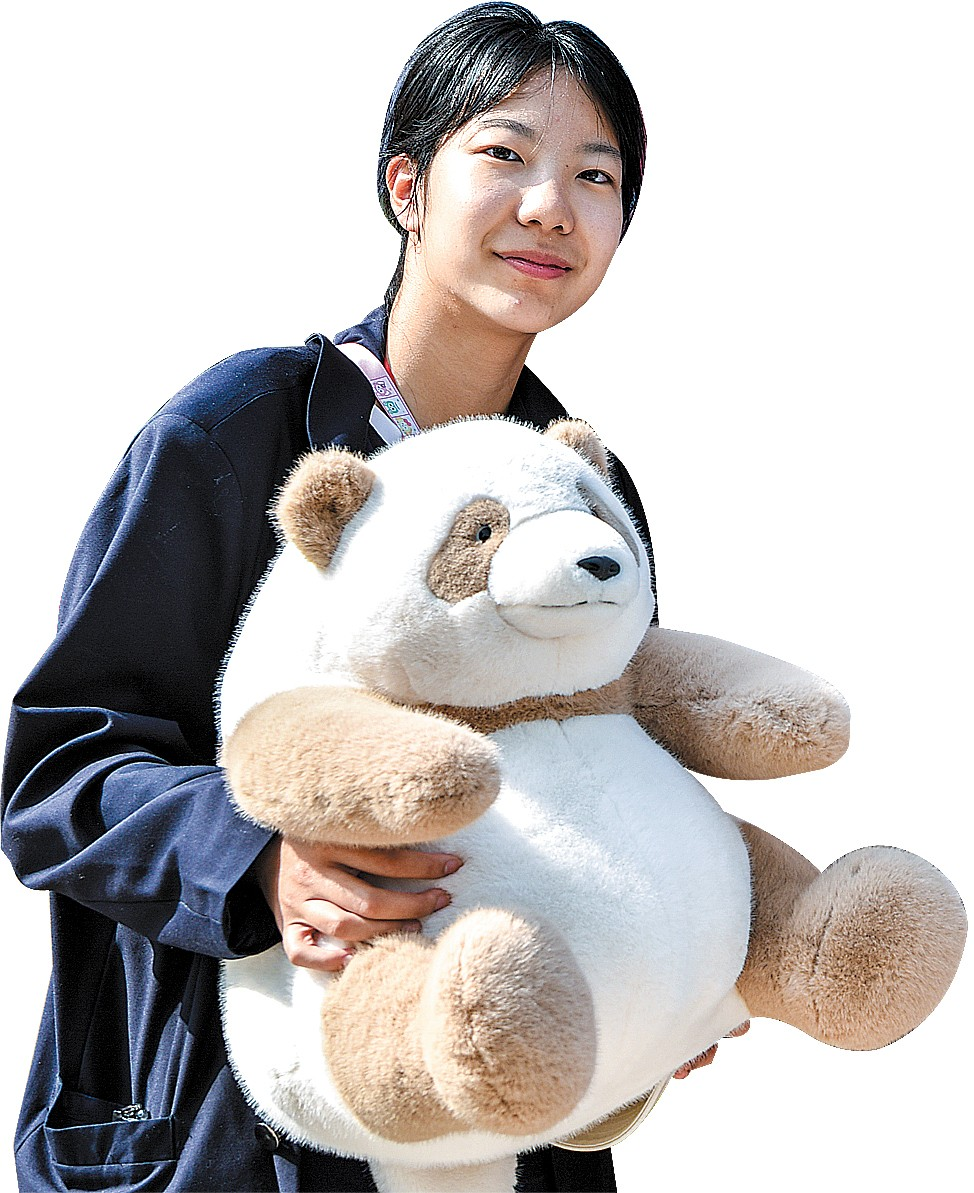
US students hold plush toys during a visit to a zoo in Shijiazhuang, Hebei province, on April 21. LIU ZUNSHUAN/XINHUA
-
Energizing of central region highlighted
Energizing of central region highlighted
-
Xi to attend China-Arab meeting
Xi to attend China-Arab meeting
-
Xi stresses efforts to deepen reforms
Xi stresses efforts to deepen reforms
-
Xi welcomes US visitors to see real China
Xi welcomes US visitors to see real China